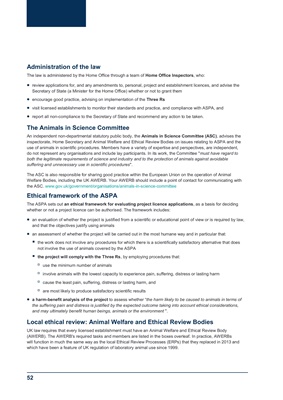
52
Administration of the law
The law is administered by the Home Office through a team of Home Office Inspectors, who:
review applications for, and any amendments to, personal, project and establishment licences, and advise the
Secretary of State (a Minister for the Home Office) whether or not to grant them
encourage good practice, advising on implementation of the Three Rs
visit licensed establishments to monitor their standards and practice, and compliance with ASPA, and
report all non-compliance to the Secretary of State and recommend any action to be taken.
The Animals in Science Committee
An independent non-departmental statutory public body, the Animals in Science Committee (ASC), advises the
inspectorate, Home Secretary and Animal Welfare and Ethical Review Bodies on issues relating to ASPA and the
use of animals in scientific procedures. Members have a variety of expertise and perspectives, are independent,
do not represent any organisations and include lay participants. In its work, the Committee "must have regard to
both the legitimate requirements of science and industry and to the protection of animals against avoidable
suffering and unnecessary use in scientific procedures".
The ASC is also responsible for sharing good practice within the European Union on the operation of Animal
Welfare Bodies, including the UK AWERB. Your AWERB should include a point of contact for communicating with
the ASC. www.gov.uk/government/organisations/animals-in-science-committee
Ethical framework of the ASPA
The ASPA sets out an ethical framework for evaluating project licence applications, as a basis for deciding
whether or not a project licence can be authorised. The framework includes:
an evaluation of whether the project is justified from a scientific or educational point of view or is required by law,
and that the objectives justify using animals
an assessment of whether the project will be carried out in the most humane way and in particular that:
the work does not involve any procedures for which there is a scientifically satisfactory alternative that does
not involve the use of animals covered by the ASPA
the project will comply with the Three Rs, by employing procedures that:
use the minimum number of animals
involve animals with the lowest capacity to experience pain, suffering, distress or lasting harm
cause the least pain, suffering, distress or lasting harm, and
are most likely to produce satisfactory scientific results
a harm-benefit analysis of the project to assess whether "the harm likely to be caused to animals in terms of
the suffering pain and distress is justified by the expected outcome taking into account ethical considerations,
and may ultimately benefit human beings, animals or the environment ".
Local ethical review: Animal Welfare and Ethical Review Bodies
UK law requires that every licensed establishment must have an Animal Welfare and Ethical Review Body
(AWERB). The AWERB's required tasks and members are listed in the boxes overleaf. In practice, AWERBs
will function in much the same way as the local Ethical Review Processes (ERPs) that they replaced in 2013 and
which have been a feature of UK regulation of laboratory animal use since 1999.